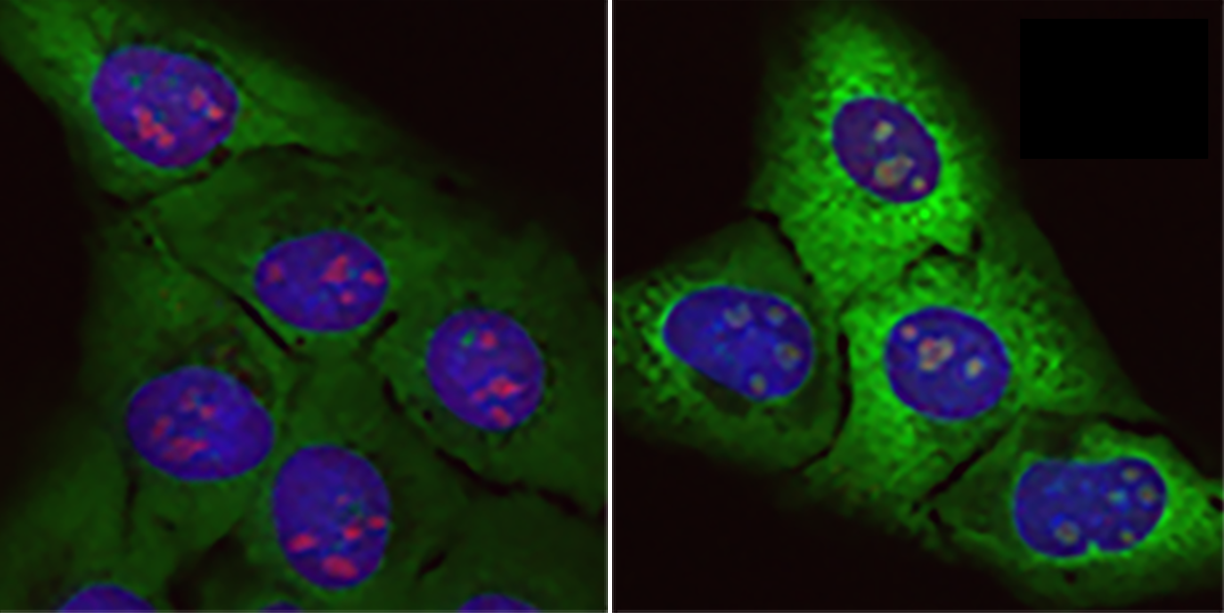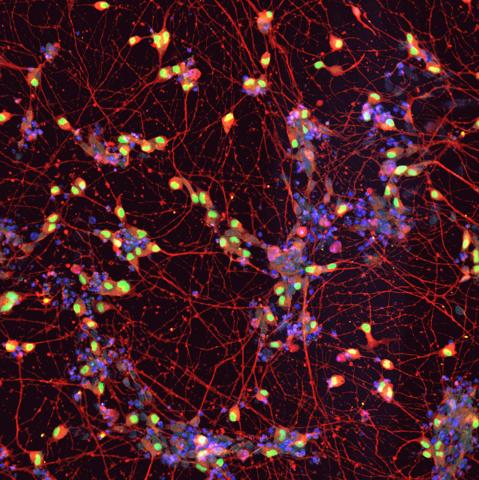Reaction to study suggesting that accumulation of 'junk proteins' could be a possible cause of ALS
In a paper published in Molecular Cell, a team of researchers led by the Spanish National Cancer Research Centre (CNIO) provides the first evidence that a possible cause of the hereditary type of ALS - familial ALS - is the accumulation in motor neurons of 'junk proteins', proteins with no function that accumulate unduly and prevent the cell from functioning properly. In addition, the research describes a new causal factor in the ageing process: nucleolar stress, which encompasses alterations in organelles called nucleoli.

Accumulation of "junk proteins": normal cells (left) and cells subjected to the effect of the toxic arginine-rich protein (right). In the latter, ribosomal proteins (green fluorescent) and the size of nucleoli (red) are increased. Credit: CNIO.
David Pozo - ELA
David Pozo Pérez
Professor of Biochemistry and Molecular Biology at the University of Seville, principal investigator at CABIMER (CSIC-US) in the Laboratory of Cellular and Molecular Neuroimmunology
Inside the nucleus of our cells lies the nucleolus, a complex structure formed by RNA and proteins whose characteristic function is the synthesis of ribosomal RNA as part of ribosome formation. These ribosomes are part of the factory that generates proteins in our cell. Therefore, the architecture and dynamics of the nucleolus (number, size, structure, etc.) reflect the need of our cells to synthesize proteins, a energetically costly process. And if there are cells with altered proliferation activity and metabolism par excellence, these are cancer cells. Hence, nucleolar function is used as a prognostic tool in different types of cancers.
However, beyond its canonical function in ribosome genesis, for over a decade we have had multiple pieces of evidence that the nucleolus acts as a sensor of various forms of cellular stress. When stress situations and their responses become chronic, as in neurodegenerative or metabolic diseases, we may be facing molecular events that play an important role in their onset and development. Understanding these mechanisms is relevant for designing strategies that allow us to intervene and modify the natural history of a disease.
On this occasion, the teams led by biologist Oscar Fernández-Capetillo at the CNIO in Madrid and the Karolinska Institute in Stockholm have for the first time linked nucleolar stress with the aging process in an animal model. The authors of the study published in the journal Molecular Cell have demonstrated that nucleolar stress is associated with the accumulation of protein-R, proteins ("garbage") that are part of the ribosome but are under this situation outside their physiological context. This cascade of events accelerates the aging process when induced by exposure to a type of arginine-rich peptides. In this sense, these arginine-rich peptides have been associated with different mutations present in diseases such as ALS, spinocerebellar ataxia, or limb hypoplasia/aplasia syndrome.
These findings could contextualize nucleolar stress with these pathologies and also identify signaling pathways on which to potentially intervene, such as the mTOR pathway. Although the mTOR pathway is complicated for the development of therapeutic interventions due to lack of specificity and potential unwanted side effects, the novelty of the findings is significant. In this regard, extending these observations to patients is still pending, and as the researchers discuss in the study, this phenomenology and mechanisms of action have not yet been identified in aging that we can classify as normal and not mediated by exposure to arginine-rich peptides. Overall, the findings of the research team are an excellent example of goal-oriented basic research, and will undoubtedly help us better understand complex phenomena that respond to the interaction of many factors that we must identify beforehand, both in health and in pathological states.
Oleksandra Sirozh et al.
- Research article
- Peer reviewed



